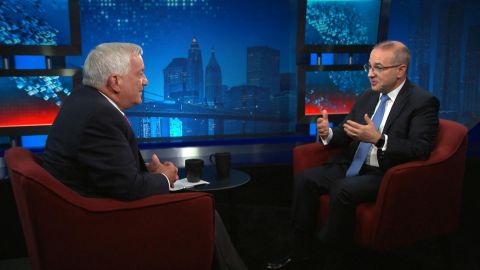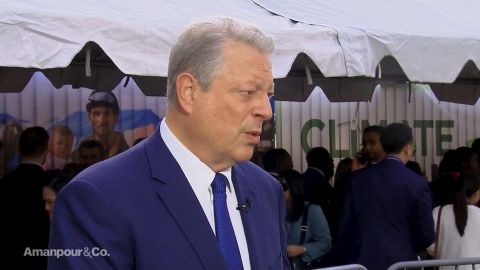Read Transcript EXPAND
CHRISTIANE AMANPOUR: John Brown, the former CEO of BP says it must be a carbon tax. Is that something that will fly in the United States of America?
AL GORE, FORMER U.S. VICE PRESIDENT: Well, some jurisdictions already have it. Some states already have it. And I certainly am strongly in favor of it. For those states and regions and countries where the carbon tax is abridged too far politically, I think they should. But there is an indirect — there’s a way to indirectly put a price on carbon. China is doing that. The European Union is doing that. So, whatever works best in each jurisdiction. But it has to be high enough, whether it’s direct or indirect, to really drive the switch to renewable energy and electric vehicles and sustainable activities in manufacturing, farming and forestry.
AMANPOUR: You’re not just a climate evangelizer but — and let’s not forget it’s 13 years since “Inconvenient Truth,” which was such a game changer, but you’re also a politician. What do you say to people who are still resisting the idea of changing their way of life, changing the way they eat, changing the way they farm?
GORE: Yes.
AMANPOUR: You know, who fear that the cure is worse than the disease.
GORE: Well, first, I’m a recovering politician. But to address your question directly, these changes that are now important and necessary for the survival of humanity are not really burdens. They are opportunities. That’s not just a glib phrase. We can have cleaner air and cleaner water, more employment, and a better way of life. There’s also resistance to making changes, particularly to big systems we take for granted, these polluting cars and trucks and coal- burning plants. But once we get over that inertia, then it opens up a brighter future that is better in every way.
AMANPOUR: So, I want to just read a statistic that you put in your op-ed, which is quite frightening. You said every day, still to this day, with all this new knowledge, with all the wind and the solar and this and that, every day we emit more than 140 million tons of global warming pollution, that’s according to the IPCC, the equivalent of half a million bombs Hiroshima bombs.
GORE: Every day.
AMANPOUR: Every single day.
GORE: Imagine the energy released by 500,000 Hiroshima class atomic bombs exploding every 24 hours, that’s a lot of energy and it’s radically reshaping the conditions that gave rise to the flourishing of humanity. And it’s creating these much more frequent category 5 hurricanes, the draughts, the fires, the biblical deluges that are disrupting food production, tropical diseases moving northward in this hemisphere, the melting of the ice in Greenland and Antarctica and sea level rising, accelerating. These are horrible events that people see with their own eyes now. And since the scientists were right when they predicted these things years ago, we should give them our full attention when they warn us of what is coming unless we take action.
About This Episode EXPAND
Jane Harman and Gérard Araud join Christiane Amanpour to analyze renewed calls for Donald Trump’s impeachment and Boris Johnson’s unlawful parliament suspension. Al Gore discusses the climate crisis and whether or not a carbon tax will work in the United States. McKinsey’s global managing partner Kevin Sneader talks through his company’s past controversies with Walter Isaacson.
LEARN MORE


